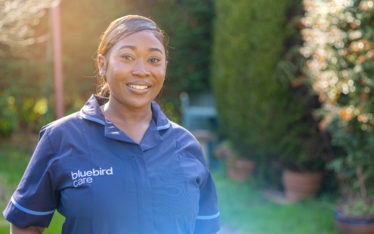Caring for an aging loved one is a journey filled with love and responsibility. However, it can also bring concerns about their safety and well-being. Whether your loved one is dealing with dementia or facing the natural challenges of aging, knowing when it’s time to seek additional care is crucial.
At Bluebird Care Merton, we specialise in providing advanced care services that allow your loved ones to remain in the comfort of their own homes while receiving the support they need.
Common Signs That Care Might Be Needed
Aging affects everyone differently, but there are key indicators that your loved one may need extra help—whether they are experiencing cognitive decline or facing physical challenges. Here are some signs to watch for:
- Difficulty with Daily Tasks
Struggling with basic activities like cooking, cleaning, dressing, or bathing can signal that extra help is needed. If your loved one is finding it hard to maintain personal hygiene or manage household chores, it may be time to consider at-home care.
- Physical Decline
Age-related physical decline is a common reason for seeking care. Look for signs like frequent falls, trouble walking, or noticeable weight loss, which could indicate mobility issues or health concerns.
- Memory Loss and Confusion
Occasional forgetfulness is normal, but if your loved one frequently loses track of time, forgets names, or gets lost in familiar places, it could be a sign of cognitive decline. Memory loss, confusion, and difficulty following conversations can be early indicators of dementia.
- Changes in Behaviour or Mood
Sudden changes in personality, mood swings, withdrawal from social activities, or increased irritability are warning signs. These changes may stem from loneliness, depression, or cognitive challenges, and they indicate that your loved one may benefit from companionship or professional care.
- Neglecting Responsibilities
If bills are going unpaid, mail is piling up, or medication schedules are being forgotten, your loved one may be struggling to keep up with everyday responsibilities. These signs can indicate a need for help managing household tasks or health-related care.
- Poor Judgment
A decline in decision-making skills is another red flag. Whether it’s making poor financial choices, neglecting personal safety, or showing a lack of awareness of potential dangers, poor judgment indicates that more supervision or professional care might be needed.

Dementia-Specific Signs to Watch For
For those concerned about dementia, early detection is key to getting the right support. Here are some dementia-specific signs:
- Memory Loss That Disrupts Daily Life
Frequently forgetting important dates, events, or names, or asking the same questions repeatedly can signal early dementia.
- Difficulty with Familiar Tasks
Struggling with activities they used to manage easily—such as cooking, driving, or managing finances—is a common sign of dementia.
- Disorientation in Time or Place
Getting confused about where they are, losing track of the date or season, or becoming lost in familiar settings are all signs of dementia.
- Social Withdrawal
If your loved one stops participating in hobbies or social activities, they may be withdrawing due to cognitive challenges, depression, or anxiety related to dementia.
When to Start Looking for Care
Recognising these signs early ensures that your loved one gets the right support, whether they need general care or dementia-specific care. Here are key indicators that it might be time to consider professional care:
- Increased Dependence
If your loved one is relying more on you or other family members for daily tasks—such as getting dressed, cooking, or managing their medications—it might be time to explore in-home care options.
- Safety Concerns
If your loved one is at risk of falling, forgetting to turn off appliances, or wandering outside due to confusion, safety becomes a priority. In such cases, at-home or live-in care can provide the supervision and safety measures necessary.
- Declining Physical Health
A noticeable decline in physical health—whether from lack of mobility, poor nutrition, or chronic conditions—may mean it’s time for more structured care. Professional caregivers can assist with daily tasks, health monitoring, and companionship.
- Caregiver Burnout
Caring for an aging loved one can be emotionally and physically demanding. If you’re feeling overwhelmed, consider seeking help. At Bluebird Care Merton, we offer tailored at-home care solutions, including live-in support, to give you the respite you need while ensuring your loved one is well cared for.

Options for Care
Bluebird Care Merton specialises in advanced care services, offering a range of at-home care solutions designed to meet your loved one’s unique needs:
- At-Home Care: Our professional caregivers provide support in the home, assisting with daily activities such as personal care, meal preparation, medication management, and companionship.
- Live-In Care: For those who require more intensive support, our live-in care services ensure that your loved one has 24/7 assistance in the comfort of their own home, promoting independence while enhancing safety.
Final Thoughts
Deciding when a loved one needs additional care is never easy, but being aware of the signs and knowing what options are available can make the process smoother. Whether your loved one is dealing with the effects of aging or early signs of dementia, Bluebird Care Merton is here to provide the advanced care and support they need to maintain their quality of life.
If you have concerns about your loved one’s well-being, don’t hesitate to reach out. At Bluebird Care Merton, we offer flexible support, ranging from 30-minute visits to 24-hour round the clock live-in care, ensuring tailored services to meet the individual needs of those we care for. We’re here to help you navigate this journey with compassion and expertise.
We believe that care matters and we are committed to providing the highest quality home care so that you or your loved one can remain in their own homes.
Instagram: @bluebirdcare_merton
Facebook: @caremerton
Tel: 020 8687 5745
Email: merton@bluebirdcare.co.uk






